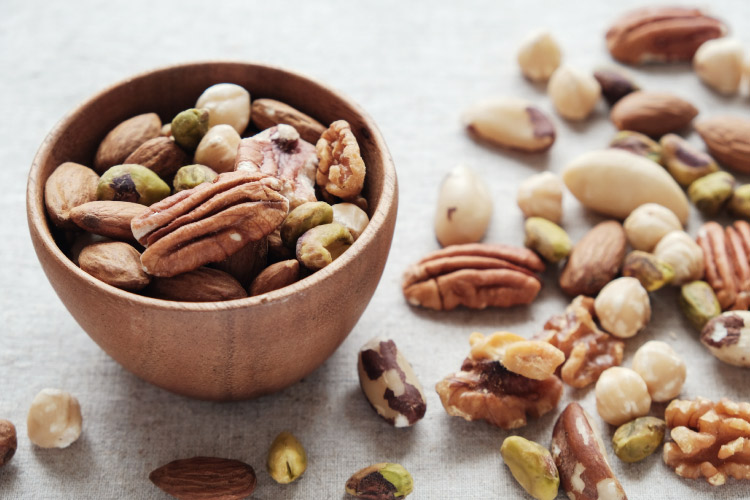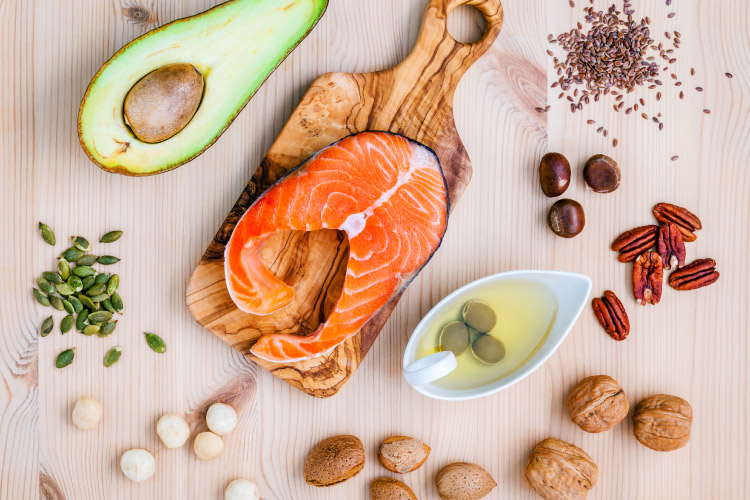
For many years we’ve been told to avoid or significantly limit our fat intake, with all fats causing obesity, heart problems and more... But did you know there is such a thing as ‘healthy fats’?
Healthy or 'good' fats are essential for human health. Studies show healthy fats can help reduce risk of disease, help extend your life, give your brain a boost and also give your skin a healthy glow. Your body requires fat intake from food as it is a major source of energy and also helps you absorb some vitamins and minerals.
In Australia, the recommended guidelines say about 30% of daily calories should come from fat. It's also important to note that most foods rarely contain one type of fat and will commonly be a combination of a few. But which fats are considered good fats? And which kind should you avoid? Read on through our quick guide to find out!

THE GOOD FATS
The good, healthy fats are Unsaturated Fats, which you’ll recognise on nutrition panels as monounsaturated fats and polyunsaturated fats (omega-3 and omega-6). These good fats come mainly from vegetables, nuts, seeds, and fish. They differ from saturated fats by having fewer hydrogen atoms bonded to their carbon chains.
Healthy fats help the cholesterol balance in your blood by decreasing the bad (LDL) cholesterol and increasing the good (HDL) cholesterol.
Monounsaturated Fat
Sources of monounsaturated fat include:
- avocados
- almonds, cashews and pecans
- cooking oils made from plants or seeds like canola, olive, peanut, soybean, rice bran, sesame and sunflower oils
Polyunsaturated Fat
You've likely heard of omega-3 and omega-6 fats: these are polyunsaturated fats. Polyunsaturated fatty acids are essential fatty acids – labelled as ‘essential’ because they are required for normal body functions however your body can't produce them itself. These fats must be obtained from food sources and the two omegas kept in balance.
Sources of polyunsaturated fat (both omega-3 and omega-6) include:
- fish such as salmon, mackerel, herring, albacore tuna, and trout
- tahini
- linseed and chia seeds
- sunflower, safflower, and flaxseed oil
- pine nuts, walnuts and brazil nuts.
Although these fats are considered healthy and essential for a balanced diet, just like with all food groups, you still must be mindful of what and how much you’re eating.

THE IN-BETWEEN FATS
The in-between, or 'okay in moderation' fats are saturated fats. The word "saturated" here refers to the number of hydrogen atoms surrounding each carbon atom. The chain of carbon atoms holds as many hydrogen atoms as possible — it's saturated with hydrogens. Common sources of saturated fat include red meat, full cream milk, cheese, ghee and coconut oil.
Is saturated fat bad for you?
A diet rich in saturated fats can drive up total cholesterol and tip the balance towards more harmful LDL cholesterol. But that doesn’t mean there isn’t a place for it in a balanced diet. Foods that are naturally high in saturated fat can be healthy and nutritious, as long as you're eating quality unprocessed foods. Full-fat dairy, for example, can be an excellent source of protein, calcium, and phosphorous. Plus, its fat content helps your body absorb essential nutrients such as vitamins A, D, E, and K.
For this reason, most nutrition experts recommend limiting saturated fat to under 10% of calories per day – but don’t be afraid to add it to your diet altogether!

THE BAD FATS
The worst type of dietary fat is the kind known as trans fat. Trans fat is known to increase our risk of heart disease by increasing the bad (LDL) cholesterol and lowering the good (HDL) cholesterol in our blood. Small amounts of trans fats naturally occur in dairy products, beef, veal, lamb and mutton, whereas industrially produced trans fats are commonly found in processed foods, junk food and fast food to help increase shelf life and save costs. Trans fats have no known health benefits and it is recommended that less than 1% of total energy should come from trans fat.
Here at Honest to Goodness we are proud to have a range of products that contain NO NASTIES ADDED! This means that we don't supply any food or ingredients with hydrogenated oils, which are also known as trans fats.
References
Barberger-Gateau, P. (2002). Fish, meat, and risk of dementia: cohort study. BMJ, 325(7370), 932-933. doi: 10.1136/bmj.325.7370.932
Fats, Oils and Heart Health | The Heart Foundation . (2020). Retrieved 16 June 2020, from https://www.heartfoundation.org.au/Heart-health-e...
Higher consumption of unsaturated fats linked with lower mortality rates. (2020). Retrieved 16 June 2020, from https://www.sciencedaily.com/releases/2016/07/160...
Nutrition guidelines | Australian Healthy Food Guide. (2020). Retrieved 16 June 2020, from https://www.healthyfoodguide.com.au/resources/nut...





